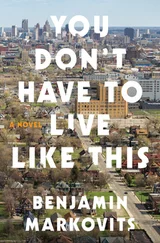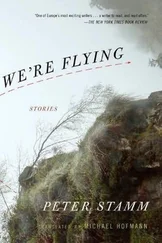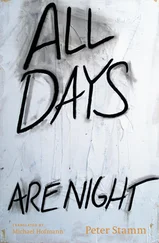He was both an extra in the imaginary film and a member of the audience, a tourist who had walked these streets for twenty years now, without ever having a sense of arriving anywhere. He was quite happy with his part, he had never wanted to be anything else. Great undertakings and major changes had always alarmed him. He walked through the streets of St. Michel or St. Germain, went up the Eiffel Tower, or took a look around the church of Notre Dame or the Louvre. He strolled across the Pont Neuf and went shopping in the big stores, even though the prices were ridiculous. Sometimes he would follow people on the street for a while, see what they bought or watched them stop in a café for a drink, and then he let them go. When he talked to friends who had spent all their lives in Paris, he was amazed by how poorly they knew the city. They barely left their quartier, and hadn’t visited the museums since their school days. Instead of rejoicing in the city’s beauty, they complained about the striking Metro workers, the polluted air, and the lack of parks and playgrounds.
Late in the afternoon, he would go to the cinema and watch an American action film, some routine story with spectacular stunts and special effects. On his way home, he would be accosted by the doormen at the sex clubs. Previously, they had always been rather slimy young men, but for some time now they were women, who were even more persistent than men. Andreas looked straight ahead and waved them away with his hand, but one of the women followed him as far as the next traffic light, talking to him, and saying, well, how about it, come on in. We have new girls.
“I live here,” he said, and crossed the street against the red light, to get rid of the woman.
It annoyed him that he was always accosted. It was as though they could see through his disguise, as though they knew something about him that he didn’t know himself. Life must be pretty hard behind the scenes, behind the blacked-out doors of the sex clubs and bars and sex shops. The thought that that life might be more real than his own upset him. In all the years he had lived there, he had never once gone to one of those places.
He slept in on Sundays. He ate breakfast in a café, read the newspaper, and listened to a young German couple argue about their plans for the rest of the day. She wanted to go to the Louvre; he didn’t. When she asked what he wanted to do instead, he had no suggestions.
At twelve o’clock, Andreas was back home. He corrected a batch of homework, then he leafed through a couple of little books he’d picked up on Friday in the German-language bookstore. They were part of a series of instruction books that he sometimes read with the more advanced pupils, little thriller texts about art thieves or smuggler bands, written in simple vocabulary of six or twelve or eighteen hundred words, that was somehow enough to describe an entire world. Andreas liked the stories, even though they were incredibly banal and predictable.
He quickly laid aside the first volume. It was about ecoterrorism, a subject that depressed him, and seemed to him unsuitable for his pupils. The second was titled Love Without Borders . On the cover, it had a line-drawing that reminded him of the Sixties, and that he found strangely moving: a young couple sitting at a sidewalk café under tall trees, smiling at one another. Andreas read the jacket copy. The story was about a girl from Paris called Angélique, who takes a job as an au pair in Germany, and falls in love with Jens, a marine biology student. The host family live in Rendsburg, up near the Danish border. Many years before, Andreas had attended a conference there once, on Scandinavian literature. He had liked the town, even though it had rained the whole time, and he hardly saw anything of the countryside.
He didn’t like reading love stories with the kids. Every kiss was accompanied by giggles and whispers and stupid remarks. But when he was younger, he had fallen in love with an au pair himself. He began reading.
I couldn’t concentrate on the traffic. I had to keep looking at her. The Volkswagen smelled of her, and of summer, sun, and fields of flowers .
Andreas thought about Fabienne, and going swimming with her and Manuel in the lake. He had gone to school with Manuel, and later, while they were both away at college, they sometimes ran into each other on the train home. Andreas was studying German and French, Manuel was qualifying as a gym teacher. He owned an ancient 2CV that was always breaking down.
Fabienne and Andreas was a love story that had never quite happened. He had been in love with her all right, but he had never been sure where she stood. One summer, they had met almost every day, had spent a lot of time together, but he had never dared to declare his love to her, and Fabienne seemed not to expect such a declaration from him. When he was already living in Paris, he wrote her a letter where he finally talked about his feelings; he never sent it.
Andreas hadn’t thought about Fabienne or Manuel for a long time. He hadn’t heard anything from them for ages. He had a vague recollection of a birth announcement, a bland baby face, with the weight and height of a newborn, as though that meant anything. Presumably he had offered his congratulations, maybe sent a gift, he couldn’t remember anymore. He had seen the two of them again, briefly, at his father’s funeral, and not since.
He turned over a couple of pages.
I took her hand and kissed it. Shortly afterward, we were lying on the canal bank .
“You are an amazing person. How can I understand you?”
“You’re not to understand me, Butterfly,” I replied, and looked at her. “I don’t understand myself. Often I don’t even know what I want, you see.”
“Too bad,” she said quietly. “It would be nice if you knew what I felt like now.”
For the next twenty minutes, neither of us spoke much. When we got up, Angélique brushed the grass off her pants .
“I like you.”
“You’re sweet.”
Andreas stared at the book. Butterfly was what he had sometimes called Fabienne, in English, because her German then was as bad as his French. And she had said he didn’t know what he wanted, in her over-distinct pronunciation. You do not know what you want.
He remembered the scene. It was a hot day. The three of them had driven out to the lake. They changed into their bathing suits in the undergrowth. Manuel said he would swim to the other side, and disappeared. Fabienne was sunbathing on her back, eyes closed. Andreas remembered her ivory-colored bathing suit, and that she had put her hair up. He looked at her, and then he bent down over her. She must have felt his shadow cross her face. She opened her eyes and looked at him.
He kissed her, and she let it happen. He laid his hand on her throat, caressed her shoulder, and gently brushed over her bosom. Then she broke free, and ran down to the lake.
Andreas stayed lying there for a while. He was stunned that he had actually dared to kiss Fabienne. He dived into the water, and set off after her. Fabienne swam slowly, head out of the water in an effort to keep her hair dry. Andreas had to hang back if he wasn’t to pass her. After a while, Manuel swam out to meet them. They turned back with him, and returned to their spot on the bank.
Later, Manuel tried to teach Fabienne the butterfly. In the past semester he had learned all the various swimming styles, and he showed off his expertise. Perhaps that was why Andreas had started calling her Butterfly. Or was it Manuel who had started that? Suddenly Andreas didn’t feel sure.
Manuel stood next to Fabienne in the shallow water, and tried to grab her by the waist, but she took a couple of quick steps away from him, and gave him the slip. Manuel set off after her. When he didn’t catch her, he splashed water at her, and she ran to the bank.
Читать дальше












